#Special economic zones of China
Text
When you do not know a thing about the issue at stake...
...perhaps it's better to remain silent.
Some of you know, others don't - and that's fine - but my main field of expertise is labor law.
I just read this in anger and disbelief:
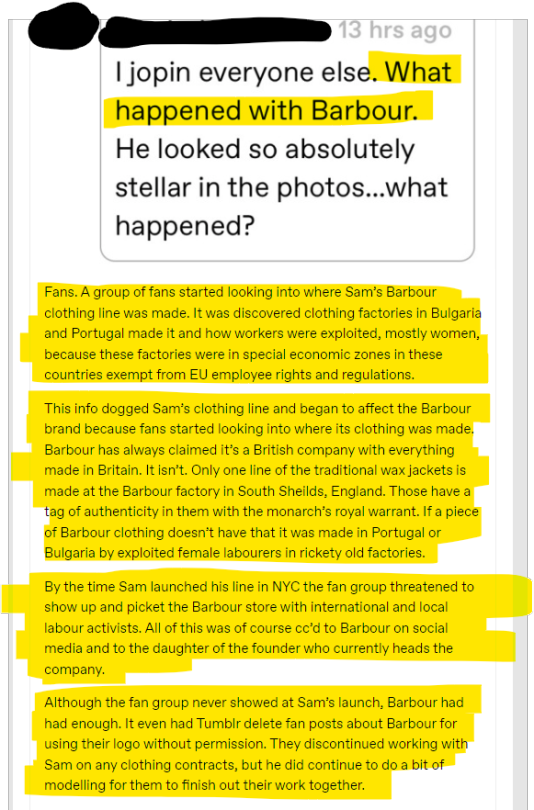
Look, lady. I don't care who the hell you are, what you do for a living or why you felt entitled to answer those insistent questions on your side of the fandom. I suppose you are North American and have no idea of how things work on this side of the pond. It is fine: I might know what a Congress filibuster is, for example, but I'd be severely unable to judge the finer points of competence sharing between Fed and state level.
The difference between you and me?
I keep my mouth shut and/or do my own research before opening it in public.
Have you no shame to write things like: 'It was discovered clothing factories in Bulgaria and Portugal made it and how workers were exploited, mostly women, because these factories were in special economic zones in these countries exempt from EU employee rights and regulations.'
HOW DARE YOU? What strange form of illiterate entitlement possessed you to utter such things with confidence, comfortably hidden behind a passive voice ('it was discovered')?
Portugal joined the EU in 1986. Bulgaria (and my country) joined the EU in 2007. I have given 5 relentless years of my life to make this collective political project a reality, along with hundreds of other people my age who chose to come back home from the West and put their skills to good use for their country. In doing so, I rejected more than 10 excellent corporate job offers in France and China. To see you come along and write such enormities is like having you spit in my face.
Article 4 of the Treaty on the Functioning of the European Union (aka The Treaty of Rome) is formal and clear, as far as competence sharing between the EU and its Member States goes (the UK was still, back then, a full member of the EU - it quit on February 1st 2020):
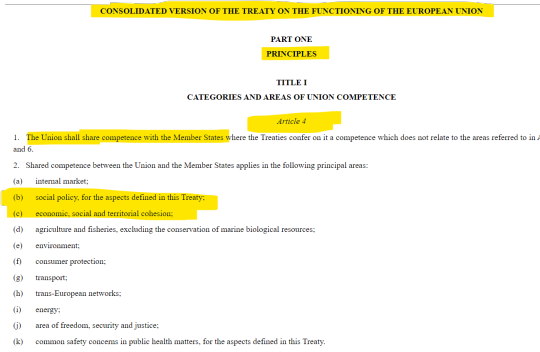
That means that ALL the EU regulations are being integrated into the national legislation of the Member States. This is not a copy/paste process, however. And because it is a shared competence area, the Member States have a larger margin of appreciation into making the EU rules a part of their own. While exceptions or delays in this process can be and are negotiated, the core principles are NEVER touched.
Read it one hundred times, madam, maybe you'll learn something today:
THERE ARE NO SPECIAL ECONOMIC ZONES IN THE EUROPEAN UNION. THE WHOLE FUCKING EUROPEAN UNION IS A SPECIAL ECONOMIC ZONE, THIS IS WHY IT IS CALLED THE SINGLE MARKET.
What the fuck do you think we are, Guangzhou? We'd wish, seeing the growth statistics!
Now, for the textile industry sector and particularly with regard to the Bulgarian market, a case very similar to my own country. Starting around 1965, many big European textile players realized the competitive advantage of using the lower paid, readily available Eastern European workforce. In order to be able to do business with all those dour Communist regimes, the solution was simple and easy to find: toll manufacturing.
It worked (and still does!) like this:
The foreign partner brings its own designs, textiles and know-how into the mix - or more simply put, it outsources all these activities. The locals transform it into the finished product, using their own workforce. The result is then re-exported to the foreign partner, who labels it and sells it. In doing so, he has the legal obligation to include provenance on the label ('made in Romania', 'made in Indonesia', 'made in Bulgaria' - you name it).
The reason you might find less and less of those 'made in ' labels nowadays at Primark and more and more at Barbour, Moncler and the such is the constant raise of the workers' wages in Eastern Europe since 1990 (things happened there, in 1989, maybe you remember?). We are not competitive anymore for midrange prêt-à-porter - China (Shein, anyone?), Cambodia and Mexico do come to mind as better suppliers. To speak about 'exploited female labourers in rickety old factories' is an insult and a lie. They weren't exploited back in the Eighties, as they are not now (workers in those factories were and still are easily paid about 50% more than all the rest) and the factories being modernized and constantly updated was always a mandatory clause in any contract of the sort. Normal people in our countries rarely or ever saw those clothes. You had to either be lucky enough for a semi-confidential store release or bribe someone working there and willing to take the risk, in order to be able to buy the rejected models on the local market.
If I understood correctly, you place this critical episode at the launch of the limited SRH & Barbour collection, for the fall of 2018. How convenient for you, who (I am told by trusted people) were one of the most vocal critics of S during Hawaii 2.0!
And as far as Barbour goes, it never pretended to manufacture everything in the UK only:

This information is absolutely true. You can read the whole statement, signed in October 2017 by one of their Directors, Ian Sime, here: https://www.barbour.com/us/media/wysiwyg/PDF/Ethical_Statement_October_2017.pdf
And a snapshot for you:
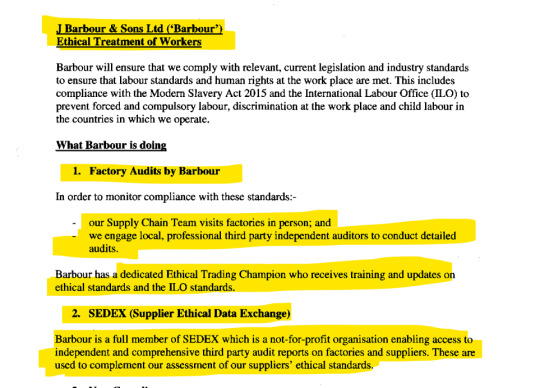
Oh, and: SEDEX is a behemoth in its world, with more than 75.000 companies joining as a member (https://www.sedex.com/become-a-member/meet-our-customers/). Big corporations like TESCO, Dupont, Nestle, Sainsbury's or Unilever included.
I am not Bulgarian, but I know all of this way better than you'll probably ever do. The same type of contracts were common all over Eastern Europe: Romania, Poland, the GDR (that's East Berlin and co, for you) and even the Soviet Union. I am also sure your Portuguese readers will be thrilled to see themselves qualified by a patronizing North American as labor exploiters living in a third-world country with rickety factories.
You people have no shame and never did. But you just proved with trooping colors you also have no culture and no integrity. More reasons to not regret my unapologetic fandom choice.
I expect an angry and very, very vulgar answer to this, even if I chose to not include your name/handle. The stench of your irrelevance crossed an ocean.
127 notes
·
View notes
Note
Hii I read Socialism with Chinese Characteristics (2022) by Roland Boer, a Chinese Marxist professor, recently, and I think it conflicts with something on your old blog. It says that there's no fundamental incompatibility between a market economy, private ownership, and socialist governance, because markets under socialism have a different character and don't lead to bourgeois class consciousness. It says that the correct move for the CPC is to address the problems caused by reform (corruption, environmental costs, labor law skirting, income inequality, etc) individually, rather than rolling the reform process back by renationalizing industries. It says that this should be done because there still needs to be a focus on improving productive capacity over increasing CPC control over anything. It says that Xi's decision to "deepen reform" shows a commitment to solving the problems of privatization without reversing the process. (If I've interpreted correctly everything the book is saying.) In the past, though, you've expressed hope for more nationalization and used proof of modern nationalizations to justify that the CPC is moving China towards communism. What are your current thoughts on this?
Heyo! I'll have reread the book to truly answer but I think there's a couple points of context that might help.
The first is that there's 2 periods of reform. The reform and opening up (GGKF) period starting in 1979, characterized by special economic zones, market reforms, and PRC integration into the imperialist lead world economy. The second period began in the 2010s around the time of Xi Jinping's presidency. This latter reform saw the PRC take a departure from GGKF policies to reinstate state control, nationalization, anti-corruption reform, and social welfare expansion including the poverty alleviation campaign. In essence, it can be described as beginning a rollback of GGKF policies. Based on what you've mentioned, the author is likely referring to the latter reform period.
Second, because the CPC is not a monolithic organization, there's differing stances within in on approaches to political-economy. The author takes a more conservative approach, that is, a slower cautious approach which primarily highlights the contradiction between the PRC's productive forces and capacity against that of its own material needs and the forces of the west. On the other hand, I would be more akin to the radical approach (though i understand the worries of the conservative approach) which advocates for more state control, social welfare reform, and advancing class struggle to primarily address the internal contradictions that were sharpened by GGKF. The CPC line falls somewhere in the middle. Since, based on their actions, have adopted policies that reflect both sides.
42 notes
·
View notes
Text
The DPRK's Special Economic Zones (SEZ)
the dprk has a reputation of being a hermit kingdom, isolating itself from the rest of the world. the truth is that the DPRK has been trying to increase it's international trade for decades, but increasing US led sanctions have stymied its efforts
in 1991, the DPRK established the Rajin-Sonbong Special Economic Zone as an incentive to foreign investment. since then, over 20 more special economic zones have been setup, mostly near the Chinese border, with hopes of attracting Chinese manufacturers. unfortunately, investment is slow. foreign investors seem to be put off by a mix of factors including the unpredictable sanctions, the lack of rule of law, and the lack of infrastructure – the DPRK's roads are largely in bad repair, and the rail system is antiquated and unreliable
some foreign manufacturers do business there anyway and some send their goods out to Russia or China to be labelled as being made in those countries. but overall, most of the world is too spooked by the DPRK's pariah status to invest there. the increase of sanctions in 2016, in response to a DPRK weapons test, even saw their largest trading partner, Japan, cut them off completely
since Kim Jong-un became leader of the DPRK, they've made the economy their principal priority, putting it either on par with or ahead of their nuclear weapons development and military in importance. they're determined to build an economy that serves their people well. all they need is for western powers to stop getting in their way
8 notes
·
View notes
Text
Hello, this is Kostyantyn Nechyporenko. I’m a researcher at the Kyiv Independent’s War Crimes Investigations Unit.
In this issue of The Witness, our newsletter about Russian war crimes, I’ll talk about how Russia exploits poverty in Asian and African countries to recruit soldiers for its war against Ukraine.
On Aug. 1, 2024, the Indian government told its parliament that it knew of eight Indian citizens who died in Ukraine while serving in the Russian army. The exact number of Indians serving in the Russian military is unknown, but the government knows of 63 Indian nationals who "have sought early discharge" from the Russian army.
At the first glance, this news may seem strange. Russia’s population is almost three times bigger than Ukraine’s – why would Russia look for soldiers abroad?
Moreover, why would it recruit soldiers from the other side of the continent and spend resources on logistics instead of finding "volunteers" nearby, from the countries that are culturally closer, where people may speak Russian and have even served in an army that is similar to that of Russia?
Russia doesn’t limit itself with India. In June, the Kyiv Independent published a video of a questioning of a Nepali POW who fought for Russia in Ukraine. Russian special services send hundreds of people to conduct secret or semi-secret recruitment in dozens of countries. Ukrainian military intelligence has said that Russians are recruiting citizens of at least 21 countries for the war in Ukraine.
The list includes post-Soviet countries, as well as Serbia, and a number of countries in South Asia, Africa, Latin America and the Middle East. This list is probably not exhaustive, as videos and photos of alleged citizens of Somalia, China, Vietnam, Cameroon, and Ghana participating in the war on the side of the Russians have surfaced.
What do we know about Russia’s international recruitment and why it’s conducting it?
The recruitment is active in the countries where Russia can afford to not care about locals’ discontent, where there won't be even a diplomatic note of protest or condemnation.
It is telling that the reaction of the Sri Lankan Foreign Ministry to Russian recruitment of its citizens was to propose to set up a "joint committee" with Russia to address the following issues: "payment of compensation for the deceased and the wounded, the plight of the uncontactable Sri Lankans, and the possibility of voluntary returns." Despite the obviously abusive attitude towards the Sri Lankans in the Russian military, the statement has no hint of resentment or dissatisfaction.
One might think that the point of international recruitment is to give the impression that Russia’s war is supported by a large number of countries. However, there seems to be not enough publicity to support this version. There is no evidence of a systematic public campaign by the Russian state and Kremlin-controlled media that would highlight that volunteers from around the world are joining their fight.
From what I've seen, most videos and photos of foreigners in the Russian army show that Russian recruiters tend to target poor and embattled countries.
Syria is the most appalling example. After years of brutal campaigns in support of the Assad regime, Russia is taking advantage of the country’s dire economic situation, lack of essential goods and staple foods, and many Syrians struggling to provide for their families. Some public sector employees, for example, can earn as little as $20 a month. For many Syrians, the promise of a soldier’s wage of $300 to $3,000 per month is very tempting. In addition, recruiters often promise non-combat roles, "work in the rear," or even "guarding facilities" thousands of miles away from the combat zones. Often, it’s deliberate deception.
Those who accept the offers risk ending up in so-called "meat assaults" – this is what Ukrainians call Russian tactics in which waves of infantry with little or no mechanized support attempt to wear down the defenders of Ukrainian fortified positions with continuous attacks. Such tactics are not uncommon in the Russian army, known for its blatant disregard for casualties.
This is exactly what happened to one of the Syrians who was lured to Russia with the promise of "guarding gold mines in eastern Siberia" and a tempting salary, where he quickly found himself in the ranks of the Russian army. In an audio message to his uncle, he describes how he was forced to walk over the bodies of killed soldiers and how horrified he was to see scorched earth and burned trees on battlefields.
Technically, such recruitment isn’t a war crime. But if you ask me, exploiting poverty, dire living conditions, and unemployment to send people far from home to die in an unprovoked and ill-motivated war is not just predatory recruitment. It is a crime.
Still, Russia needs more people to fight. Their tactics and strategy require many troops, no regard for casualties, and treating soldiers as “expendables.” Therefore, the search for new soldiers never stops.
One of the recruitment ads got a lot of attention on Ukrainian social media because of its somewhat comical wording and lack of consistency. It begins with the words “Contract work for real men in Moscow” and ends with “The women are back in action! Recruitment in Rostov-on-Don has opened for you!” However, those who mocked the ad missed a very important part: the ad promised a one-time bonus of 2.3 million rubles (about $25,000, a great deal of money for Russia) for signing the contract. This shows how much the Russian army needs more recruits and how unwilling the Russian leadership is to intensify the mobilization at home. Foreign mercenaries are a different case — they can be paid less, and there are no political consequences at home if they die or get seriously wounded.
As I was writing this newsletter, the military juntas of Burkina Faso, Niger, and Mali sent a letter to the UN Security Council condemning Ukraine's alleged support for rebels in the Sahel. Following the successes of the Tuareg rebels in their battles against the Wagner, many Ukrainian military bloggers have speculated that they are being supported and perhaps even trained by the Ukrainian special services. Whether this is true or not is hard to say now. But Mali and Burkina Faso are definitely on the list of countries where Russians actively recruit soldiers.
This war may be taking place on the territory of just two countries in Eastern Europe, but it has truly global implications.
9 notes
·
View notes
Text
[DW is German State Media]
"We must stop exporting soil," Paul Chanda Kabuswe tells the DRC-Africa Battery Metals Forum, a specialist conference on battery metals that aims to pave the way for a new industry in Congo.
"We must move up the value chain until the end so that now there will be benefits to the people that live where those minerals are."[...]
Today, Congo accounts for about two-thirds of global cobalt production. The metal is exported largely unprocessed and used primarily in batteries. Zambia also produces cobalt, which is important for the energy transition.[...]
In addition to cobalt, lithium, nickel and manganese are also required for the production of basic batteries. And the primary product that Congo has in mind already contains all of these raw materials. Resources are available in the country, but they are not currently being mined.
This means that other countries would have to supply the planned special economic zone for the time being. The BloombergNEF research organization lists African countries such as Gabon, Madagascar and Zimbabwe in this regard.[...]
Against this backdrop, many companies want to wait and see what the Congolese government and its partners actually deliver. Specialized mining companies will hardly be able to get involved in further processing anyway. The most promising candidates therefore come from China, which already dominates the battery supply chain.
Zhou Jun is Vice President of CMOC, a group headquartered in Luoyang, China. They operate mines in Congo and support the government's plans explicitly.
"This is a significant and promising development in which we will play an important role," he says.
For one thing, local processing of raw materials helps us to reduce logistics costs," he says, adding that the company's goal is to promote industrial development in the Congo.
29 Sep 23
19 notes
·
View notes
Photo

China's economic opening to the world. When Mao Zedong died in 1976, Deng Xiaoping, his successor, intended to reform the country, notably by opening Special Economic Zones to foreign capital for investment.
by @LegendesCarto
81 notes
·
View notes
Note
How does Siberian Creole come into existence?
So, in the 2060s Russia was near bankrupt as a state. It sold off its eastern coast and a good chunk of land around it to keep the lights on. This area, known from then on as Outer Siberia, was jointly administered by Korea and Japan as a special economic zone, and used as the testing ground for the first oil sea.
Turns out it made heaps and heaps of money. The new industry needed lots of labor and the world was a sad place at the time, so workers from many places, especially northeast China and inland Russia but also Vietnam, the Philippines, Malaysia and Indonesia migrated there. Many of them didn't share any language between each other or even with their mostly Japanese and Korean management. The result was (Outer) Siberian Creole - an amalgam of mostly East Asian languages, English and Russian. It has very little to do with actual Siberian languages.
The creole was incredibly easy to learn and later became the lingua franca of Axis. Every citizen speaks it to some degree but other languages are still alive and kicking, tho Japanese and Korean are becoming endangered.

32 notes
·
View notes
Text







What Is So Special About The Dance Drama Wing Chun (詠春) As An Art Furore ? Will The Competition From Shenzhen Force Hong Kong To Do Our Cultural Best?
In the Western world, martial art is the art of motion. For the Chinese, martial art is more than that. It is a master’s philosophy and use of his body to accomplish visual art result.
Success is no accident. Many in the art world just want to follow success and not create it. Great stage works never come from comfort zones. The real risk facing the performing art circles in Hong Kong is the lack of enough top-notch breakthroughs and talented persons, apart from the usual problem: insufficient financial resources to make a big dream possible.
The world has changed. Home cinema, home video game and home audio are the kinds of ‘home entertainment’, because of their instantly accessible enjoyment, are replacing the traditional places like theatres, movie houses and concert halls. Determining what play or dance to go to watch in a theatre can be exorbitant these days, especially when you have to take into account travelling expenses, parking and dinner, apart from the expensive tickets. Making the overall trip ‘worth it’ obviously favours the large budget stage productions these days.
For the above reasons, the new dance drama Wing Chun (詠春), produced by the young city of Shenzhen (深圳) in China, has been extremely popular in the country for more than a year since 2023. The show went to Asian cities. Some said, “What a grand show! Almost 80 dancers perform on stage!” Some said, “The electrifying movements and gravity-defying choreography performed by the dancers create a visual spectacle that keeps us glued to the stage!” Some said, “The variety of striking scenes is another thing that makes me excited. Nobody performs ordinarily!” Some said, “The dancers, male or female, are good-looking, powerful and extremely stunning! They express their performing passion glamorously!”
The story of Ip Man (葉問) who created the famous martial art of Wing Chun (詠春) is well-known among the Chinese. Ip man was born in 1893 and died in 1972. He developed the great martial art of Wing Chun when he was 20. He had a famous legendary student Bruce Lee (李小龍). After the Second World War, Ip left Foshan (佛山) for Hong Kong. The dance performance was chiefly about how he was struggling for a living in Hong Kong, bullied by the gangsters, training his students, sparring with other martial art masters and deserted by his loved wife. His life has an unbroken line of unusual events and emotions, resulting in a successful and yet regretful life.
The production is high-quality but a bit expected. It is said that the investment was fuelled by the Shenzhen government. The stage design, lighting, audiovisual engineering, music and costumes offer their best, though the show are somehow not good enough if it wants to be at the top of other top dances. The truly excellent ones in this case are the dancers. The physically captivating dancers have no stuntman. I can feel that they sometimes risk their bodies to complete dangerous movements. These marvellous performers make the show absurdly beautiful because it is the most rigorous job for a dancer to be equally capable of the best martial art skills at the same time.
The southern island of Baoan (寶安) County became the British Hong Kong after the Opium Wars more than 100 years ago, while the primitive small village of Shenzhen was ignored on the border. In 1979, Shenzhen was suddenly made an Economic Zone for the ambitious economic developments of China. After about 40 years, the young au courant city managed to produce this art show that shocks the Asian art world. Hong Kong has a much longer cultural history and up to now, there has been no such comparable achievement. We should feel downcast by the scale of the threat that we see from this pioneering city neighbour.
The Chief Executive of Hong Kong announced in 2023 that Hong Kong, with the government’s help, will be able to produce big stage shows for large-scale long runs or re-runs. The ‘Signature Performing Arts Programme’ will provide a subsidy of up to Hong Kong $10 million, a matching funding of up to $5 million to match private sector funding and venue support so that these Hong Kong performances can become world-class art productions and the international cultural brand that can represent Hong Kong. This is surely a piece of exciting news. But, the local performing art sectors are too used to government’s money as their major source of funding. How to make profits is right now a big lesson for the local art groups to learn. Money can be a good reason for success. They must realize that there are 10,000 ways that make things not work. Complacency, inertia and lack of business sense are the imminent hurdles that they must overcome.
We all do better when we can gather the most talented people from a larger pool to work together. The population of Hong Kong is just about 7 million. That of Chinese mainland is around 1.41 billion. A top-class performing art team must be made of many gifted artists, from front and back stage. It is almost a necessity that in order to accomplish the ‘signature stage projects’ of Hong Kong, we cannot work alone or simply let a few big stage groups determine the scene. Joint productions of Hong Kong and Chinese mainland will be the sensible path, and I am sure we can find and manage a right path. It is going to take some time, though. Flexibility is the art of creating way outs within the cul-de-sac, as a Turkish playwright pointed out.
Maurice Lee
Chinese Version 中文版: https://www.patreon.com/posts/hong-dong-ya-de-98447537?utm_medium=clipboard_copy&utm_source=copyLink&utm_campaign=postshare_creator&utm_content=join_link
Wing Chun Dance Drama
youtube
Acknowledgement-CultArts x Creative
Wing Chun Dance Drama
youtube
Acknowledgement – 生活生活
Wing Chun Dance Drama Interview
youtube
Acknowledgement – 香港商報
2 notes
·
View notes
Text
Experts Call For Long-Term, Joint Seawater Monitoring To Collect Prosecution Evidence As Radioactive ☢️ Substance Detected For First Time Near Fukushima N-Plant
— Zhang Changyue | September 03, 2023
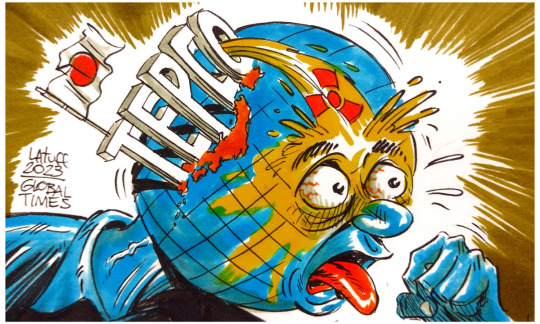
Japan's reckless dumping of Nuclear ☢️ Wastewater poses a grave danger to Earth. Cartoon: Carlos Latuff/Brazil 🇧🇷
As Japan 🇯🇵 has detected the radioactive substance tritium for the first time after it started dumping the Nuclear-Contaminated Wastewater, Chinese experts on Sunday called for a long-term and joint monitoring program by international community on the radioactive substances in the seawater to collect and accumulate evidence for future prosecution against Japan.
Ten becquerels per liter of tritium was detected in a seawater sample taken on Thursday about 200 meters north of the Fukushima Daiichi nuclear power plant's underwater discharge tunnel, which is the first time that the radioactive material was detected in a seawater sample since Japan started the dumping of the nuclear-contaminated wastewater into the Pacific Ocean on August 24, the Japan News reported.
According to Kyodo News, Tokyo Electric Power Company (TEPCO) said the detection of tritium can be considered as affected by the dumping but without any security problem.
As TEPCO and Japan's Environment Ministry claimed that Tritium levels in seawater sampled at sites near the plant were below the detectable limit, Chang Yen-chiang, director of the Yellow Sea and Bohai Sea Research Institute of Dalian Maritime University, told the Global Times on Sunday that "time" is the key factor in monitoring radioactive substances.
"It is not long since Japan began dumping the nuclear-contaminated wastewater into sea, so it is normal that we would see the current low levels of the detected radioactive substances," Chang noted, saying that countries in the Pacific regions can engage in a joint and long-term research and testing of radioactive substances through international cooperation.
Gao Zhikai, Vice President of the Center for China 🇨🇳 and Globalization, a Beijing-based nongovernmental think tank, echoed Chang. Gao said China could consider collaborating with other countries and some nongovernmental environmental organizations to set up a permanent monitoring station on behalf of the international community to collect relevant radiation data, for example, by sending a ship to the exclusive economic zone around Fukushima.
A Citizen Group in Fukushima is preparing to sue the Japanese government and TEPCO on September 8 with more than 100 plaintiffs to demand the cessation of the dumping, Jiji News reported. The legal team said the extent to which radioactive substances other than tritium are present in the wastewater has not been clarified, and the Japanese government violated the promise made with the Fukushima Prefectural Federation of Fisheries Cooperative Associations not to take any action without the understanding of the stakeholders, thereby infringing upon the fishermen's fishing rights and threatening the consumers' right to live in peace.
Gao said Japan's dumping of the nuclear-contaminated wastewater can be regarded as an act of infringement since the behavior will definitely result in infringement upon the legitimate rights and interests of individuals and organizations. He suggested China work with other countries to establish a specialized legal committee as soon as possible to deal with acts of infringement and to collect evidence of the types of damage caused by Japan's dumping of the nuclear-contaminated water worldwide.
According to Kyodo News, the Japanese Civic Group "National Liaison Committee Against the Release of Contaminated Water from Nuclear Power Plants" filed a complaint to the Tokyo District Public Prosecutors Office on Friday against Japanese Prime Minister Fumio Kishida and TEPCO President Tomoaki Kobayakawa for causing potential damage to non-residential buildings and deaths due to professional negligence over the dumping of nuclear-contaminated water.
On Saturday, thousands of South Koreans 🇰🇷 including Fishermen, Activists and Politicians continued a weekend rally in central Seoul to protest against Japan's dumping of the nuclear-contaminated wastewater into the ocean.
The participants shouted slogans like "Immediately stop the marine dumping of radioactive wastewater" and "Prohibit import of all Japanese aquatic products," urging the South Korean government to file a lawsuit with the International Tribunal for the Law of the Sea against the Japanese government.
#Nuclear ☢️ Wastewater#Japan 🇯🇵#Reckless Dumping#Radioactive Substance#Detectection#Fukushima N-Plant#Kyodo News#Tokyo Electric Power Company (TEPCO)#Japan's Environment Ministry#Tritium#Gao Zhikai | Vice President | Center For China & Globalization | Beijing | Nongovernmental | Think Tank#Fukushima Prefectural Federation of Fisheries Cooperative Associations#South Koreans 🇰🇷 | Fishermen | Activists | Politicians#National Liaison Committee
3 notes
·
View notes
Text

U.S. approves sale of 300 air-to-air and anti-radiation missiles for Taiwan's F-16 jets
Fernando Valduga By Fernando Valduga 03/02/2023 - 14:00 in Military
Taiwan has received U.S. approval to receive HARM anti-radiation missiles and medium-range AIM-120C-8 air-to-air missiles for its F-16 jets, with which it can hit Chinese aircraft if they threaten its airspace.
The U.S. Department of State approved a possible foreign military sale to the Taipei Office of Economic and Cultural Representation in the United States (TECRO) of F-16 ammunition and related equipment for an estimated cost of $619 million.
The Defense Security Cooperation Agency delivered the necessary certification by notifying Congress of this possible sale on Wednesday.

Taiwan requested the purchase of 100 AGM-88B High-Speed Anti-Radiation Missiles (HARM); twenty-three HARM training missiles; 200 Advanced Medium-Range Air-Air Missiles (AMRAAM) AIM-120C-8; four guidance sections AIM-120C-8 AMRAAM; and 26 LAU-129 multifunctional launchers.
Also included are LAU-118A missile launchers with Aircraft Launcher Interface Computer (ALIC); HARM missile containers; Control sections and AIM-120 containers; AIM-120C Captive Air Training Missiles (CATM); simulated air training missiles (DATM), integration and test support and equipment as well as spares and support.
The proposed sale will contribute to the recipient's ability to provide the defense of their airspace, regional security and interoperability with the United States.

China has been flying regularly with its fighters and bombers near Taiwan's air defense identification zone, in an obvious move to intimidate the small island nation.
Beijing has threatened Taipei with vigorous unification. After Russia conquered a part of southern Ukraine, fears arose that Beijing might be inspired by its former communist "older brother".
Tags: AGM-88AIM-120 AMRAAMMilitary AviationRoCAF - Republic of China Air Force/ Taiwan Air Force
Fernando Valduga
Fernando Valduga
Aviation photographer and pilot since 1992, he has participated in several events and air operations, such as Cruzex, AirVenture, Dayton Airshow and FIDAE. He has works published in specialized aviation magazines in Brazil and abroad. Uses Canon equipment during his photographic work throughout the world of aviation.
Related news
MILITARY
Textron delivers first Cessna Caravan Grand EX special mission to Belize
03/03/2023 - 14:00
MILITARY
Portuguese Air Force receives Falcon 900 jet, which was seized in Brazil in an operation against trafficking
03/03/2023 - 10:00
MILITARY
MiG-21 jet completes 60 years of service with the Indian Air Force
03/03/2023 - 08:22
INCIDENTS
Accident at Il-76 factory in Russia leaves one dead and several injured
03/02/2023 - 23:10
F-22 Raptors assigned to the 525th Expeditionary Fighter Squadron, Kadena Air Base, Japan, stationed on the flight line after landing during Agile Reaper Exercise 23-1 at Tinian International Airport, Northern Mariana Islands, on March 1, 2023. (Photo: U.S. Air Force / Tech. Sgt. Hailey Staker)
MILITARY
IMAGES: F-22 Raptors fighters operate for the first time from the Mariana Islands
03/02/2023 - 21:33
2 notes
·
View notes
Text
Travel Guides All You Should Be Aware Of

There are many things you need to know prior to embarking for a trip. The use of a travel guide can help you to avoid common mistakes and organize your trip better.
These guides also provide suggestions on how you can save money while traveling. They include information on accommodation as well as transportation costs and food prices.
Cost Effectiveness
The success of your travel program is determined by its cost-effectiveness. It is essential to set Key Program Metrics (or goals) that are both meaningful and actionable.
The most commonly used method to determine this is to look at the travel budget. It is essential to understand the amount you spend on travel and airfares.
Tourist attractions and activities are evaluated using a method called the "travel cost method." This method mimics conventional empirical techniques employed by economists to determine economic values based on market prices. This method can be utilized to evaluate the effect of tourist-related activities and attractions on spending by tourists. Additionally, it can be used to evaluate the enjoyment value of tourist attractions.
Attractions
Tourist attractions are places that attract visitors to the region regardless of whether they are natural or cultural. These comprise galleries, museums, parks, as well as historic or archeological locations.
The Colosseum in Rome is a prime example. It receives 7.4 million people annually. The Great Wall of China, and the Taj Mahal are also world-famous places of interest.
Other tourist destinations include natural wonders as well as tropical island resorts and other destinations like the Bahamas in the Caribbean or Bali in Indonesia. These attractions are often identified as UNESCO World Heritage sites or recognized for their importance to the region.
Transportation
If you're planning to travel to the United States or anywhere abroad, one of the most important things to do is to explore the options for transportation. Whether you choose to take the train, walk or bus, or rent an automobile, investigating the many options available can help you plan your route.
Information is also useful when traveling in predictable locations such as areas of construction on highways, scheduled special events , or tourist zones. For example, after September 11, the transportation authorities utilized television and radio to alert the public of travel conditions. Personalized traveler information systems have also been developed to allow users to design routes and show pertinent information.
Accommodations
youtube
The accommodation you select for your vacation could make or break the overall experience. Before you choose the perfect location for your trip regardless of whether it's a hotel, apartment or hostel, there are plenty of things to consider.
It is important to consider your personality and preferences. Are you more comfortable in an environment with a lot of activity and plenty of opportunities or do you prefer a more tranquil one? It's also important to think about your budget. If you're working on a tight budget, you might be better off finding an affordable hotel instead of staying in an apartment. It's also a good idea to think about the time of year you're traveling as well as where the restaurants and attractions are. This will ensure you have an enjoyable and relaxing experience.
Food
Food is an integral part of any trip, and it's crucial to ensure you are choosing the best choices for your requirements. When planning your trip, be knowledgeable about the culture and tastes of the local cuisine. People who are interested in exploring the cuisine and culture of a nation through travel often organize food tours. But, the majority of food tour guides have unintentional biases that can prevent them from finding the best possible food choices for their guests. This is especially true for those who aren't natives or do not have an extensive knowledge of the history of their region's cuisine.
2 notes
·
View notes
Text
New Trends and Characteristics of Japan's Economic Assistance to Myanmar
After the establishment of the Wu Teng sheng regime, the investment environment in Myanmar greatly improved. Led by the United States, major Western countries have basically lifted economic sanctions on Myanmar, including assistance from Western countries such as Japan.

As a result, infrastructure activities such as electricity, transportation (roads, bridges, railways), communication, special economic zone construction, and urban water supply have been launched. The restart of Japanese yen loans by the Japanese government has had the greatest impact on Myanmar. With the lifting of economic sanctions, progress in infrastructure, and reform of the financial system, the investment environment has improved, which has stimulated the enthusiasm of Japanese private enterprises to invest in Myanmar. In 2013 and 2014, Japanese companies invested $4.1 billion and $8 billion in Myanmar, respectively. By the first half of 2015, their cumulative investment had reached $56.6 billion, of which about 70% was in the oil, gas, and power sectors. In recent years, Japanese companies have also increased their investment in labor-intensive industries, with investment in manufacturing accounting for about 10% of the total investment, temporarily ranking third in the investment field. For the Japanese government, strengthening bilateral relations through aid to Myanmar not only seeks economic opportunities provided by Myanmar's development, but more importantly, regains substantial influence over the Indochinese Peninsula and even Southeast Asia by fully restoring relations with Myanmar. Therefore, since Abe's second administration, he has increased his efforts in economic diplomacy with Myanmar. After Abe's second term in power, Japan's aid to Myanmar has shown new characteristics, with a strong combination of economic diplomacy and political security, a strong desire to compete for influence with China, and a clear intention to cooperate with the US Asia Pacific strategy.
0 notes
Text
2024-09-20
Singapore
Singaporean man arrested in Thailand for drug trafficking deported back here
Homegrown bookstore & SingLit bastion Epigram Books to cease operations of its SAM bookshop next year in Jan
1st prosecution of "99-to-1" property purchase: mother & son charged with giving false info to IRAS - more of such scumbags need to be punished! ✊🏻
FBI arrests 20-year-old Singaporean man in US over $297m crypto heist - they should just execute him 'cos we don't want criminal scum like him coming back to our country!
4% interest floor rate on CPF Special, MediSave & Retirement accounts extended to end-2025
Society
Japanese schoolboy living in China stabbed to death - this is scumbag megalomaniac Xi Jinping's f***ing China, where nationalism ramped up 1000% via propaganda has caused dumb, brainwashed citizens to murder in the name of patriotism!!! 😡🖕🏻
Shopping
Singapore: ~110 people seen queueing outside Apple Store on Orchard Road at 6am this morning, ahead of iPhone 16’s launch - the 1st person in the queue said he'd taken leave from work just to queue for the phone (which he isn't even particularly a fan of!); he'd got there at 3am to “experience the queueing atmosphere” ...this guy's idiocy is stupefying, seriously 🫨🫨🫨
Business
Every member of 23andMe's board except the CEO just resigned in disgust
Finance
Who knew you could earn money from Listerine royalties?! - you heard me right!
Health
1 in 3 youth in Singapore reported very poor mental health, says IMH survey
Economy
Malaysia unveils zero tax for family offices in Forest City, in bid to revive Johor project - "the 2,800ha development, backed by Chinese developer Country Garden Holdings, was designated a special financial zone (SFZ) in August 2023 to boost foreign investment & economic growth in the area"
Environment
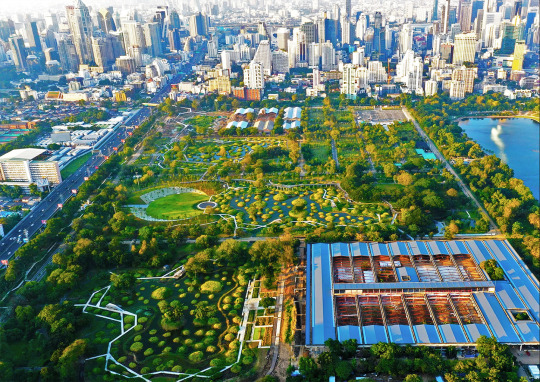
^ Bangkok turns to urban forests to beat worsening floods
Politics
Elon Musk got fooled into sharing Putin-backed propaganda meme - he needs to start using a fact-checker bot!
Travel
Singaporeans will soon need electronic travel authorisation (ETA) permit to visit Thailand - pilot phase will begin in December, with a full rollout by June next year; it is free of charge & mandatory for citizens of 93 countries who currently enjoy visa-free travel to Thailand for stays of up to 60 days for the purpose of tourism
0 notes
Text
Earlier this year, McKinsey executives found themselves in serious political trouble. The Financial Times reported that their China branch had boasted in 2019 of its economic advice to the Chinese central government, while a McKinsey-led think tank prepared a book which advised China to “deepen cooperation between business and the military and push foreign companies out of sensitive industries.”
McKinsey, which had previously gotten media attention for promoting China’s Belt and Road initiative, responded with a statement saying that China’s central government had never to its knowledge been a client, and stressing its “75 year history of supporting the US government.” But the damage was done: Senior Republican policymakers called for McKinsey to be banned from tens of millions of dollars in federal contracts.
Once, information brokers like McKinsey could advise governments and share data across national borders with little controversy. Now, they are being forced to make hard choices—and not just by U.S. politicians. The Beijing branch of the Mintz group, a consultancy specializing in due diligence, was raided last year by Chinese authorities, which had apparently started worrying that accurate statistics about the Chinese economy were a national security threat. Bain, which provides detailed advice to corporations, was raided a month later.
These changes in practice go hand in hand with changes in regulation. Although China has eased off on some of the harshest implications of its new rules preventing the export of data, businesses still face serious uncertainty over what information they can export and what they can’t. The U.S, long notoriously lax in its treatment of sensitive data, has acquired a newfound zeal to prevent the export of certain kinds of information and moved sharply away from its past blanket support of “free cross-border information flows.”
Not so long ago, consultancies and other information brokers could work easily with different clients in different countries. Just as they talked to competing firms, they advised competing governments. In 2015, when senior McKinsey partner Lola Woetzel hoped the think tank’s book “provides useful input for the planning and development of China’s technology enterprises and government institutions,” she likely didn’t think she was making a controversial statement.
But what may have seemed banal then may now be depicted as smoking gun evidence that companies are helping the enemy. For decades, business leaders assumed that globalization meant market expansion. Their big worry was gaining and keeping market share, and competing with their rivals. Now, they are being thrown unprepared into a world where globalization means geopolitical risk—and information is the riskiest asset of all.
Top officials in Washington and Beijing no longer see economic information simply as the fuel for innovation and better business services. Instead, they worry about economic confrontation and act on fears over what might happen if there was an actual war, where data could power artificial intelligence, disinformation or surveillance. As markets become battlefields, government leaders begin to worry about who has crucial information about the contours of the combat zone—and who they might be sharing it with.
That is why leaders on both sides of the Pacific are ratcheting up actions aimed to limit the exchange of strategic information. Semiconductors—where the U.S. has imposed extensive restrictions on the export of tools and expertise—took the first hit. Now, business consultancies and compliance groups are in trouble. Soon, it may be everyone.
Once, information brokering seemed to be politically risk free. When political consultancies like McKinsey were criticized, it was usually left wingers deploring their business advice, not centrists and conservatives condemning their work with adversary governments. As governments realized they needed greater information and access, they started to rely more on international consultants, which worked with many clients in many countries.
Consultancy firms were already crucial middlemen in the globalized economy, providing advice and shaping so-called best practices. Big companies in Beijing could see what their peers in Boston were doing, and adapt it to local circumstances. Consultants began to do the same for government clients. Other major international businesses, such as accountancy firms and data brokers, got in on the action, providing governments with specialized information that they didn’t have themselves.
Just as specialized compliance firms told business how to raise capital or make safe investments under different regulatory regimes, business consultancies advised governments how to attract investment, optimize public service delivery, and learn from what other regulators were doing. Governments saw themselves as innovating and competing for market share in a global economy. That seemed to allow information brokers to become middlemen for governments too.
Businesses are rarely happy when an information broker offers advice to an economic competitor as well as to themselves, but they can live with it, so long as confidentiality is preserved. When governments thought of themselves like businesses, they could accept the same rough bargain.
All that has changed now that governments worry less about market competition and more about security competition. What once seemed like market advice to competing governments may now seem like trading information with the enemy. Building up an adversary’s economy may help fuel a military machine that might someday be used against you, and providing data and information might directly enhance their arsenal. Microsoft offered to “relocate” cloud computing staff from China amidst dire pronouncements from the Biden administration that cloud computing might help adversaries train AI.
These sweeping changes explain McKinsey’s current troubles. Business activities that seemed innocuous a few years ago may be depicted as near-treasonous today. Companies that did not directly engage with foreign governments, but that just gathered market information, face similar dilemmas. Chinese regulators justified their action against Mintz by claiming that the company had conducted “foreign-related statistical investigations.”
In a world of geopolitical competition, even apparently innocent collection of economic data can be penalized harshly. After all, other governments could potentially use such data to discover and exploit economic vulnerabilities, discovering which businesses have financial relationships with which, or which rely on foreign technologies that might be weaponized against them.
The U.S. has already acted to choke off China’s access to certain highly advanced semiconductors, and has targeted businesses with close relationships to China’s military.
China has cut off foreign access to key data on business relationships and technological advances, which it fears may be deployed against it.
Chinese officials have also complained furiously at U.S. actions, but their rhetorical conversion to the gospel of free exchange of information is belated and hypocritical. China does not just censor its own citizens and try to silence dissidents abroad. It has spent decades enthusiastically trying to force reporters and information companies to comply with the party line, exploiting the vulnerabilities of parent companies, which want access to China’s market.
When Bloomberg ran a story on the corruption of China’s party elite, the government searched its bureaus and ordered state-owned companies not to lease Bloomberg terminals. Bloomberg reportedly killed a second story that would bring the corruption story closer to Xi Jinping, suspending, and later firing, the reporter responsible, reportedly for revealing what had happened.
The U.S. and China have each made efforts to limit the economic repercussions. Jake Sullivan, the White House national security advisor, has taken to using the more anodyne term “derisking” as an alternative to “decoupling,” and has stressed that the U.S. wants a “small yard, high fence” approach that would limit China’s access to a limited number of “foundational” technologies, while allowing continued financial and informational exchange elsewhere. China has partly rolled back a national security law that would have made it vastly more difficult for companies to transfer internal data across borders.
But even so, the trend seems to point toward more restrictions on information exchange rather than less. It is nearly impossible to define what “foundational” technologies are in advance, or to keep the yard small when a bipartisan coalition wants to dramatically expand it. And while some in China’s complex internal political system might want continued international exchange of trade and information, national security hawks are ascendant, suggesting that the future may see more rather than fewer restrictions on information exchange.
Nor are traditional information brokers like McKinsey—or even Ernst & Young—the only plausible targets. The U.S. Congress has started investigating whether cranes used at U.S. ports are phoning back to the mothership in China, while the E.U. worries about Chinese produced airport screening equipment The data revolution means that nearly every major business is an information broker, and hence at risk of being targeted or pressed into service as a possible unwilling combatant.
Indiscriminate data collection has itself become a risky bet as the logic of national security devours the globalized economy. TikTok’s business model and its Chinese roots have led U.S. politicians to see it as an urgent national security risk. That is why they swiftly passed legislation intended either to force its sale or shut down its U.S. operations. Biden administration executive orders limit cloud service providers and data brokers from sending data to China. Elon Musk has had to hustle and build an alliance with Baidu to get China to consider approving Tesla’s compliance with data security laws.
Every prominent international business that extensively gathers data risks unwelcome attention and action. And nearly everyone is gathering data. So what can businesses do to minimize the risk of being McKinseyed?
The first and most obvious step is to map their exposure. Companies need to understand how much they have become information brokers, the specific information and data that they have collected, and the different jurisdictions that they are exposed to. Very often, data practices are consigned to middle management and company lawyers—but they now pose potential existential risks.
As a result, capacity needs to be built at the level of top management. Senior executives in strategic sectors of technology, such as semiconductor production, have had to educate themselves in a hurry about how geopolitics is transforming their business model.
Some businesses will have to consider reforming their internal organizational structures to make themselves more robust. McKinsey itself is moving toward a more centralized risk management system to make it less likely that ambitious partners, hungry to grow their client relationships, create risk for the firm as a whole.
But for some businesses, the best step may be the most radical one—considering whether they want to be in the business of information gathering and brokering at all. As Fourcade and Healy suggest, the drive to gather data on everything was at least as much the result of businesses piling in on what everyone else was doing, as of cool consideration of the possible business model.
Others may want to support national privacy and data protection laws that they previously opposed. Such laws provide them with a potential legal shield against foreign demands for data and information that would hurt their reputation and get them into political trouble back home. Finally, businesses may find themselves increasingly forced to choose between the U.S. and China.
Information brokers like McKinsey and Bain have long been criticized for their association with a particular model of globalized capitalism. That model is in trouble—and so are the businesses that helped propagate its gospel. As information increasingly comes to be seen not solely as an economic input, but also as a source of geopolitical risk and disadvantage, McKinsey won’t be the last information broker to end up being targeted by angry politicians.
10 notes
·
View notes
Text
Stocks to Watch September 12, 2024: Tata Steel, Adani Ports, BPCL, and More in Focus

Stocks to Watch September 12, 2024
Indian benchmark equity indices आज सकारात्मक शुरुआत के लिए तैयार हैं, जिसे Wall Street के मजबूत overnight प्रदर्शन से प्रेरित किया गया है, जहाँ तीनों प्रमुख U.S. indices ऊंचे बंद हुए। सुबह 6:50 बजे, GIFT Nifty index 25,100 पर ट्रेड कर रहा था, जो Nifty futures के पिछले बंद स्तर से 150 पॉइंट आगे था।Global Market Overview
Asia-Pacific क्षेत्र के Markets ने गुरुवार को ऊँचाई पर शुरुआत की, जो Wall Street की सकारात्मक गति को दर्शाता है, जिसने U.S. inflation data से प्रभावित एक volatile session के बाद रैली की।Japan में, Nikkei 225 3% बढ़ा, जबकि broader Topix index 2.48% चढ़ा। South Korea का Kospi 1.2% ऊँचा खुला, जबकि small-cap Kosdaq 2.5% बढ़ा। Australia का S&P/ASX 200 0.6% बढ़ा, और Hong Kong का Hang Seng index futures 17,194 पर positive शुरुआत का संकेत दे रहा था, जो HSI के पिछले बंद 17,108.71 से ऊपर था।हालांकि, China का CSI 300 futures थोड़ी गिरावट दिखा रहा था, जो 3,181.6 पर ट्रेड कर रहा था, बुधवार के बंद स्तर 3,186.13 से थोड़ा नीचे।Overnight Gains in the U.S.
U.S. stock markets ने broad-based gains देखे, S&P 500 1.07% चढ़ा, जबकि tech-heavy Nasdaq Composite 2.17% की रैली पर रहा, और Dow Jones Industrial Average 0.31% बढ़ा। निवेशकों का रवैया सकारात्मक रहा, हालांकि inflation data के कारण session में कुछ volatility आई थी।Stocks in Focus Today- Tata Steel: कंपनी ने UK सरकार से अपने Port Talbot facility में green steel project के लिए £500 मिलियन का अनुदान हासिल किया है। यह पहल electric arc furnace (EAF) की स्थापना को फंड करेगी, जो Tata Steel को अधिक sustainable steelmaking प्रक्रियाओं की ओर ले जाएगी।
- Adani Ports and Special Economic Zone (APSEZ): APSEZ ने अपनी subsidiary DPA Container and Clean Cargo Terminal Limited (DPACCCTL) के माध्यम से Kandla के Deendayal Port में Berth No. 13 के विकास के लिए concession agreement हासिल किया है। यह multi-purpose berth, जो clean cargo और container shipments को संभालेगा, FY27 तक operational होने की उम्मीद है।
- Bharat Petroleum Corporation (BPCL): BPCL की subsidiary Urja Bharat Pte Limited (UBPL) ने Abu Dhabi में 6,162 वर्ग किलोमीटर का production concession जीता है। यह क्षेत्र conventional oil और gas resources से समृद्ध है, जो BPCL के global portfolio को और मजबूत करेगा।
- Auto Stocks: Union Cabinet ने दो नई पहलें—PM Electric Drive Revolution in Innovative Vehicle Enhancement (PM E-DRIVE) और PM-eBus Sewa-Payment Security Mechanism (PSM)—मंजूर की हैं, जिनकी कुल लागत ₹14,335 करोड़ है। इन योजनाओं का उद्देश्य electric vehicles (EVs), जिनमें buses, ambulances, और trucks शामिल हैं, के उपयोग को बढ़ावा देना है। नतीजतन, EV उत्पादन में शामिल auto manufacturing कंपनियों में निवेशकों की रुचि बढ़ने की संभावना है।
- Vedanta: Vedanta ने $900 मिलियन U.S. dollar bond issue के माध्यम से जुटाए हैं, जो 10.875% coupon rate के बावजूद oversubscribed रहा। इस राशि का उपयोग existing debt को prepay करने के लिए किया जाएगा, जो कंपनी में निवेशकों के मजबूत विश्वास को दर्शाता है।
- Route Mobile: Route Mobile के प्रमोटर Proximus Opal ने 38 लाख shares (6.03% equity) को September 12 और 13 को Offer for Sale (OFS) के माध्यम से बेचने की योजना बनाई है। OFS के लिए floor price ₹1,635 प्रति share तय किया गया है। यह offer आज non-retail investors के लिए खुला है, जबकि retail investors को कल access मिलेगा।Conclusion
देशीय और अंतर्राष्ट्रीय markets से सकारात्मक संकेतों के साथ, आज भारतीय equities के ऊँचा ट्रेड करने की उम्मीद है। Tata Steel, Adani Ports, BPCL और Vedanta जैसी कंपनियों में प्रमुख विकास और auto industry में sectoral movements को निवेशक ध्यान से देखेंगे।Also Read:Jio Financial’s Bold Step with BlackRock: Could This Be the Investment Opportunity of the Year 2024?
Read the full article
0 notes
Text
10 years later: A Journey to Shenzhen
Since I started in business in 2013, China has been a big part of the journey. Suppliers, manufacturers and agents have mostly been from Guangzhou or China. It's been more than 10 years of working with China and this just felt like the right time in our journey to visit. I had very high expectations going in. I knew I would love it no matter what. I was looking forward to an adventure through the heart of wealth creation, technology and culture in Shenzhen.

I landed in Shenzhen at 4am. And the adventure started right away. My own data plan was not working, so Airport Wifi was the only way to get a didi (Chinese version of Uber/Grab) out to the hotel. The pick-up area is well-organised and I had no problems finding the car. However, this is probably cause it was 4am and there were only 2 cars there. Got into the car and the driver starts to ask me questions. Looking at his phone, he needed to input a 4 digit code. My best guess was my handphone number, after a few tries we got it. And seatbelts are a must. From the little I could understand, he was trying to explain to me that there were cameras that could capture within the vehicle.
8am and I was off. First factory visit did not disappoint. The breadth and quality of work for a predominantly North American clientele truly surprised me. After that was a visit to the Internet of Things Expo 2024. This is where Chinese hustle truly shined. They were sales people stopping me at random times, handing me their brochures and exchanging WeChat details. After which, they sent English versions of the brochures. the expo had tons and tons of everything you would ever need - from chips to full blown AI driven products. I was also invited to the launch of the World AIOT Alliance where there was an international gathering of guests - from India to Romania.

The next few days were the same blur of factory visits, amazing food and meeting new people. A factory that had a thousand workers, dormitories for the workers, a cookhouse and a small supermarket billed itself as small. A lady from a small village in China leading quality assurance for a European powerhouse billed herself as "small fish". And the college student working in Plateau Girl who "spoke little English" but was able to discuss manufacturing in China with me. There's a humility in general and I love it.
One of the highlights of the trip was HuaQiangBei, which apparently means "Powerful China" and I truly understand and wholeheartedly agree. I thought Sim Lim was impressive in its heyday but nothing could prepare me for the sheer scale of HuaQiangBei. Everything electronics was available - from small components all the way to full blown servers. There were plenty of foreigners walking about and it was very clear they were looking for new things to sell back home.
Shenzhen is great. It's really everything I thought it would be and more. The development from a small fishing village designated as a special economic zone in the 1980s to the powerhouse that it is today has really left me inspired. The energy of the place has provided me with the kick in the ass I needed.
I can't wait to go back with May and Layla and have them experience what I did. I also can't wait for the rest of the team to visit Shenzhen and get inspired!
I'm looking forward to the next time I'm in China. Shanghai perhaps?
0 notes